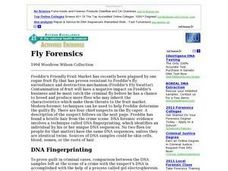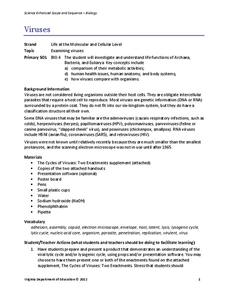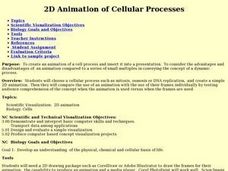Curated OER
What Does That DNA Molecule Really Look Like???
Students extract DNA from animal liver cells. They separate, collect and describe the appearance from the extracted DNA while role playing as an intern in a city's forensics.
Curated OER
DNA the Easy Way (and "Gram Stain" Without the Mess)
Students visualize DNA from cells and explain the basis and importance of the Gram-stain reaction and to perform the KOH test equivalent.
Curated OER
Cell Structure and DNA
Sixth graders identify, locate and describe the function of the parts of a cell. In groups, they state the five stages of mitosis and put them in the correct order. They are introduced to the structure of DNA and mRNA and how they...
Curated OER
Fly Forensics
Freddy's Friendly Fruit Market is under attack by fruit flies, and it is up to your aspiring biologists to solve the crime! By reading and analyzing the phenotypes, detectives determine which fly is responsible. This memorable assignment...
Curated OER
The Cell Cycle: Cell Growth, Cell Division
Help your students understand cell division. Explore the topics of mitosis by examining the details of chromosomes at interphase, metaphase, anaphase, prophase, and telophase. Wonderful slides will keep your students' attention...
American Museum of Natural History
Keeping a Field Journal
Recording scientific evidence allows for important discoveries and conclusions. A remote learning resource outlines how to create a field journal to record scientific observations. The outline resource includes notation about the...
Virginia Department of Education
Genetic Variation and Mutations
Young scientists demonstrate their creativity while completing several activities, to assess genetic variations and mutations. Instructors provide a list of options and scientists choose to write a comic strip, create a book,...
Teach Engineering
Show Me the Genes
Give your class a chance to show what they know. In the last installment of a seven-part series, pupils summarize and review what they have learned in the series. They present their solutions for creating a biosensor to detect cancer...
Beyond Benign
Kitten Creation
Your pupils become geneticists as they create cat offspring. The next lesson in a series continues an exploration of genetic makeup as scholars consider parent traits to build their offspring. Using household items, they create kittens...
Agriculture in the Classroom
"Steer" Toward STEM: Careers in Animal Agriculture
Think like an engineer and an agricultural scientist over the course of 12 lessons in a STEM based unit. Young scientists take on the roles of animal physiologists, animal geneticists, agricultural engineers, animal nutritionists,...
Beyond Benign
What is Biotechnology
Examine the sequence of key events in the history of genetics. An engaging lesson asks scholars to sort events to create a timeline of biotechnology milestones. Arranging the events gives learners a perspective on the development of...
Agriculture in the Classroom
Roll of the Genes
Animal reproduction in sheep and cattle is explored with the help of Punnet squares. Scholars employ tools using probability to conclude the color of wool a sheep's offspring will have. Acting as animal geneticists, pupils then take...
Rain Bird Corporation
Rain Forest Teaching Curriculum
Take young naturalists on an exploration of the world's tropical rainforests with this extensive collection of lessons and activities. Whether its creating leaf and flower prints or investigating the absorption spectrum of...
Virginia Department of Education
Viruses
Germs, parasites, and viruses, oh my! Facilitate a lesson on viruses as individuals explore functions of Archaea, Bacteria, and Eukarya. They learn how viruses compare with other organisms in nature and how they contribute to health...
Biology Junction
Genetic Problems
In a world of DNA testing popularity, understanding how to solve basic genetic problems allows scholars to better understand and interpret test results. They work through many different types of genetic problems using statistics, Punnett...
Howard Hughes Medical Institute
RNA Diversity
Messenger RNA, transfer RNA, and ribozymes ... the many faces of RNA. The structure of RNA makes it much more versatile than the very similar DNA. Learners view a slideshow presentation to learn all about the different forms and...
Curated OER
Genetics and Molecular Biology
Students create DNA models using colored construction papers. In this biology instructional activity, students identify enzyme restriction sites. They model how DNA plasmids replicate when taken up by a bacterial cell.
Curated OER
Simulation of Gene Splicing
Learners simulate gene splicing by examining bacteria. They create a bacterial DNA into which they insert the human DNA (gene) that codes for growth hormone. They cut the sites of the enzyme to study how the human DNA can be joined to...
Curated OER
2D Animation of Cellular Processes
Pupils create an animation of a cell process and insert it into a presentation. They choose a cellular process such as mitosis, osmosis or DNA replication, and create a simple 2D animation.
Curated OER
Genes: The Building Blocks of Life
Students examine various topics on genetics. Students explore the Internet to gather information on genetic testing, genetically engineered food, forensics, DNA and cloning. They research and determine the best way to fund each of the...
Curated OER
Transcription and Translation Lab Activity
Students investigate DNA strands. They study the sequence to determine if it is DNA or RNA and write the mRNA nucleotide sequence. After stringing the beads together to create the mRNA sequence they translate it into an amino acid...
Curated OER
Who's Who and How Do You Know for Sure?
Young scholars investigate the applications of DNA fingerprinting, They read crime scenarios and using the details of the crime and laboratory experimentation decide the suspects guilt or innocence.
Curated OER
"Who Done It?" Analysis of Molecular Fingerprints Left At the Scene of the Crime
Learners examine different types of DNA fragments. They record and analyze their results. They determine who is the criminal in the story.
Curated OER
Fingerprinting
Students discover the basics of fingerprinting and how it identifies a person. They create their own fingerprints and compare them to classmate's to determine that no two people have the same identity because of fingerprints. Then they...























